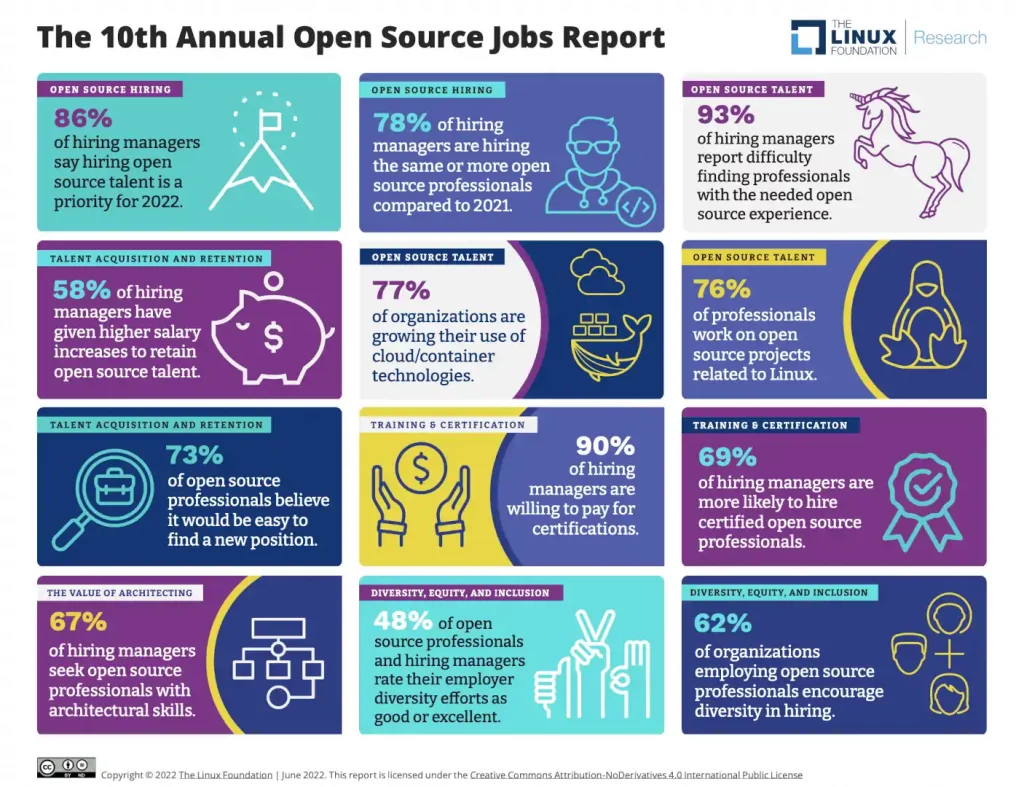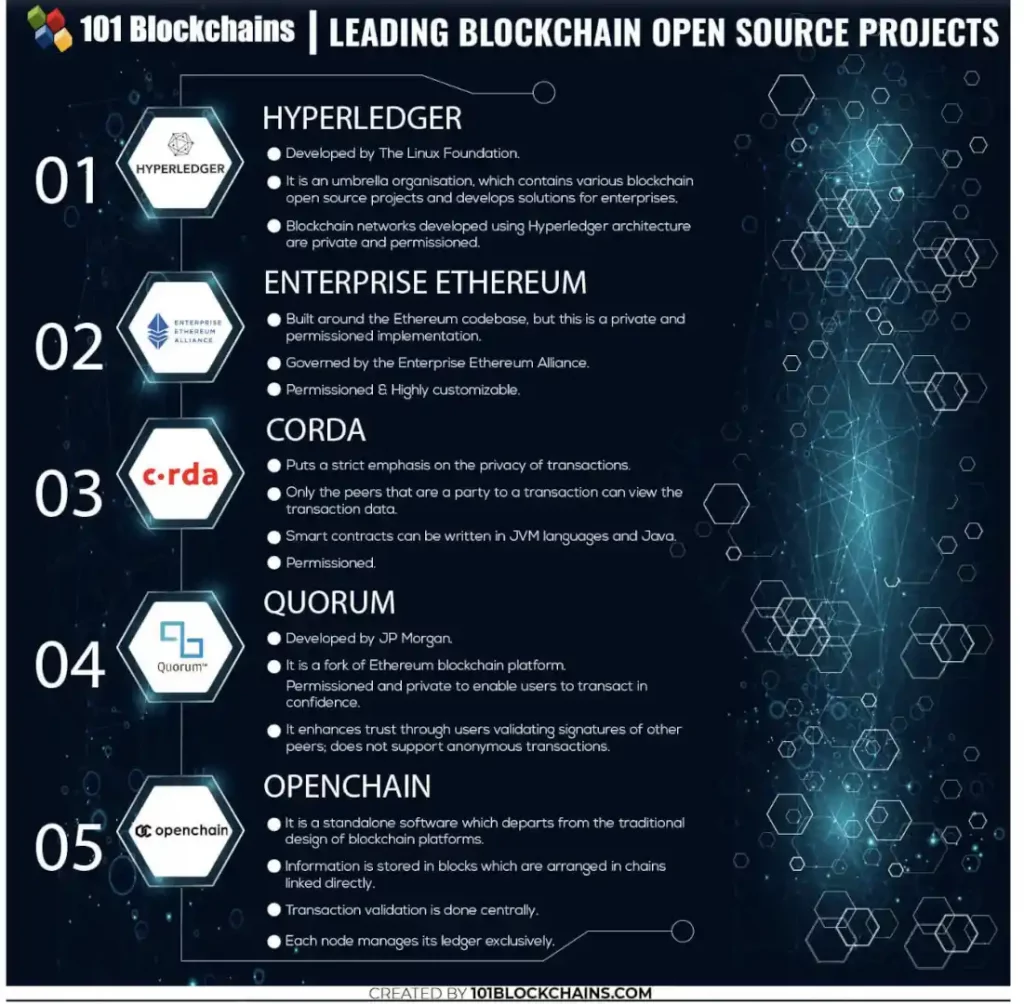Open-source software is a growing necessity for development projects across most industries. Gartner says that over 95% of the IT enterprises across the globe use open-source software for important IT functions. Another issue for developers is that proprietary software development often creates siloed environments that are slower to innovate.
Open-source projects need talented developers, of course. The demand for developers is skyrocketing as tech innovations scale in traditional development and now with blockchain as well.
Unfortunately for companies, the market for open-source developers is particularly challenging right now. 93% of employers report challenges in finding people with sufficient open-source skills, even as almost half of them plan to increase their open-source hiring in the next 6 months.
Further complicating the situation is the fact that 73% of open-source professionals believe it would be easy to move on to a new role at will. The infographic below shows some more compelling statistics related to finding and hiring developer talent.
The infographic below from Linux gives a good overview of the overall open source hiring and recruiting situation.

Developers were ahead of the remote working curve even before the global pandemic. Now that flex time and remote work are commonplace, lifestyle flexibility is less of a differentiating factor. Recent studies show that salary and financial incentives are playing a larger role in hiring and retaining developers, yet companies still need a strategy beyond the paycheck.
Beyond salary consideration, how else can companies compete for the best talent?
Oprah Winfrey once said that the one thing everyone had in common from her thousands of interviews was they all basically wanted to be seen, heard, and to feel like what they said mattered or made a difference.
Her observations speak to a basic human need for recognition. Another powerful motivating factor for people who are moving up Maslows hierarchy is a desire to add value around a shared purpose. In fact, shared purpose is a major attraction of open-source communities.
According to the latest Linux open-source Jobs Report, open-source developers say the best thing about their job is the ability to work on interesting projects, collaborate with a global community, and work on cutting-edge technology challenges.
Beyond the reward that the salary represents, companies that find ways to tap into candidates’ baseline desires for recognition, purpose, intellectual challenge, and community will have more luck retaining talent. Shared purpose is important, too.
It turns out that working on open-source projects can provide many of those non-monetary benefits for developers. When companies support developers’ participation in open-source communities, their efforts create many beneficial ripple effects.
First, the company is subsidizing the developer’s desire to build respect and purpose among their peers. Second, when the developer shows up in the open-source communities as an employee of a company, they are in effect a brand ambassador. A happy employee is the best recruiting tool of all. Their presence gets the company's brand out in front of other developers which can help in future recruitment.
With competition as fierce as it is for the development talent, companies need to think outside the box of relying solely on traditional recruiters. People-ops and HR employees can search GitHub for projects that are similar to your company’s work. Top contributors on the platform are a source of potential candidates, or connections to peers looking for work.
Companies shouldn’t be recruiting only when a specific position is open. They can ask new hires for their dream team list and begin to cultivate those developers for a short list of ideal potential candidates for future projects. Hiring developers with a presence in open-source communities allows the company to capitalize on the developer's network.
Which Open-Source Community is Best for Recruiting?
The open-source community a company chooses to be active in depends on what kind of projects the company needs programmers to work on. Different platforms appeal to different use cases.
For example, 69% of employers are looking for developers with cloud and container skills, which drives demand for Linux.
Driven by blockchain’s growing utility outside of cryptocurrency, the current talent demand is highest for blockchain developers. Decentralization and transparency are fundamental to blockchain; you could say blockchain has open-source ethos baked into its DNA. One open-source project is the Hyperledger Fabric project from the Linux Foundation. Others include Ethereum, Corda, Quorum, and more.

Other open-source communities include Drupal for content management, phpList for email management, GIMP for photo and video editing, and Apache OpenOffice for office suite functionalities.
The Bottom Line
While compensation is important to attracting developer talent, it is not the only factor. Companies who create strategies to support their programmers’ continued growth in learning, career development, and making a difference will have an edge over employers with no strategy.
Cultivating a presence in open-source communities and supporting a development team’s participation are smart moves that can reap long-term benefits in attracting and retaining talent.
Sharkbyte can help you identify and fill gaps in your development team recruitment efforts. Contact us today!
Checklist for Recruiting Strategies Leveraging Open-Source Communities
A strategic approach to brand perception on open-source platforms is a necessity for recruiting talent. There are many other ways to support developers, grow brand recognition and engagement in the open-source culture. Suggestions include:
- Send dev teams to participate in open-source events.
- Hire talent from open-source projects that are aligned with company goals.
- Subsidize your developers working on contributing upstream.
- Consider offering open-source training for your developers to build talent from within.
- Track the contributions of your developers, measure their impact, and share results with a wider audience.
- Create mentorship programs for junior developers.
- Provide proper IT infrastructure that will allow your developers to communicate and work with the global open-source community without any challenges.



